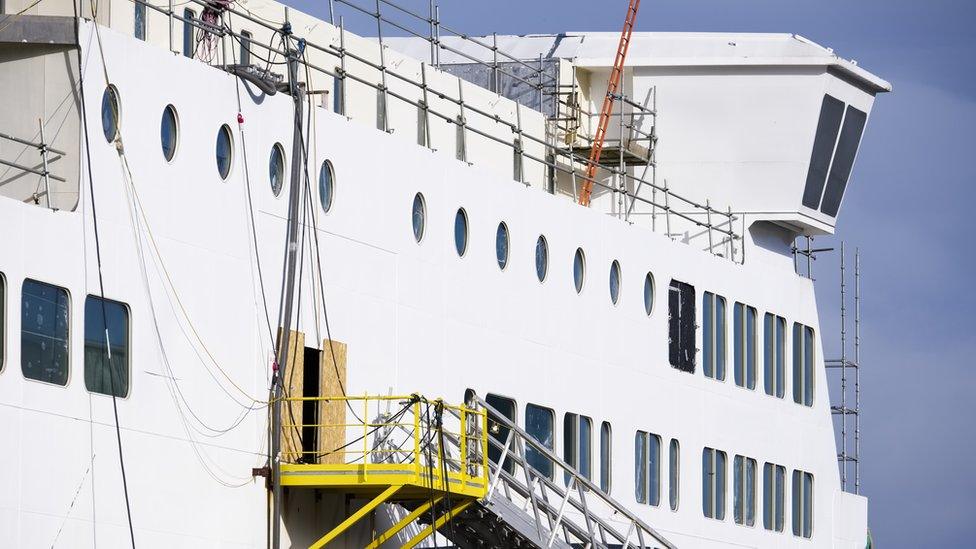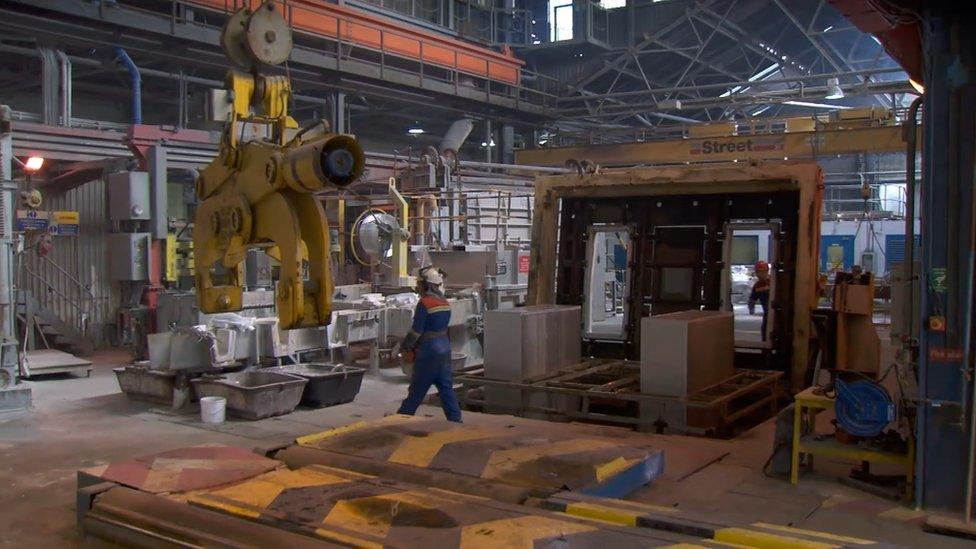Is the Scottish government about to take ownership of a smelter?
- Published

As England gets another factory making wind turbines, Scotland may yet get the consolation of the contract that pitched BiFab fabrication yards into administration
Prestwick and Ferguson Marine are two assets owned by the Scottish government that may bring important developments this month, ahead of the Holyrood election
Another manufacturing enterprise could fall into Scottish government hands. If the GFG metals empire fails to refinance and quickly, there could be consequences for ministers from the eye-popping deal they did to underwrite the hydro-powered aluminium smelter in Lochaber

The search for an industrial policy continues. It has been spotted today on Teesside where 750 jobs are pledged by GE Renewables, for a factory building the turbine blades to go in a vast wind farm to the east, on Dogger Bank.
With 1,500 jobs estimated in the supply chain, that is great news for a part of England that feels left behind. It adds to the Siemens turbine factory on Humberside, employing 750 so far, and recently unveiling plans to double its footprint.
But it's a reminder of all the announcements of turbine factories in Scotland - "the Saudi Arabia of renewable energy" - that have come to, er, nothing much.
As a sort of consolation prize, a large hydro plant and aluminium smelter may be about to fall into Scottish government hands. More on that later.
You'll probably recall that second prize to the turbine factories was fabricating the jackets on which the turbines sit - and that turned into a sorry and expensive tale of the demise of BiFab.

Its Methil and Burntisland fabrication yards were supposed to get a £30m contract for eight platforms for the wind farm being built by EDF off the East Neuk of Fife.
But the Scottish government withdrew the offer of a security bond for that contract, saying it had been rendered commercially unviable and therefore illegal under state aid rules.
The good news for Methil, and perhaps the BiFab yard near Stornoway, is that all is not lost.
With the business bought out of administration by a newcomer to fabrication, under the Harland & Wolff brand best known at its Belfast shipyard, EDF'S principal contractor has not placed the order anywhere else, and Harland & Wolff told me that security bonds are, in general terms, something they handle.
To the Scottish government, there might yet be something to show for the £53m ploughed into BiFab as equity and debt, and lost.
Ferries timetable
It might also get something for the £43m loaned to Prestwick Airport since it was saved from closure in 2013. A preferred bidder has been found at last.
It would be a relief for Scottish ministers to get it off their hands before the Holyrood election campaign starts. I hear that's the intention. But don't expect a new owner to take on that debt.
Both seem quite minor beside the Ferguson shipyard saga. It's months since we last had an update on the delivery timetable and cost for those two Cal-Mac ferries that were due to cost £97m, and should have been in service two years ago. The price is at least double that, with £45m loans also lost when the business was put into administration.

Tim Hair, the yard's boss under Scottish government ownership, has just updated MSPs on some extra millions added to the bill by lockdown delays.
His immediate challenge is to find the skilled workers needed to move to seven-day working. They are sought after by other shipyards and building sites, less tainted by a history of insolvency.
The firm is "working to" the timetable for delivering the first ferry, Mr Hair told Holyrood. In the world of project management, that's not the most reassuring phrase. MSPs have been promised a fuller update before parliament winds up on 25 March.
Steel rolling
By that time, a sizeable chunk of Lochaber may have fallen into public hands.
It should be stressed that Sanjeev Gupta, chairman of the GFG Alliance group of companies, sounds optimistic about finding new finance, since the Australian money man he relied upon to build a global metals empire, Lex Greensill, had his company put into administration this week.
Greensill Capital was deemed by credit insurers to be too exposed to GFG. By unhappy coincidence, GFG was heavily exposed to Greensill, and needs to refinance, in a hurry.
A GFG subsidiary, Liberty Steel, operates several steel plants and employs 3,000 people in the UK, more than 100 of them at the Dalzell steel-rolling works in Motherwell.
Under pressure to explain his predicament, Mr Gupta told unions on Tuesday that metal prices had picked up with global economic prospects, but his UK operation requires a lot of financial support. His plant in Rotherham is a particular problem.
On Thursday morning, he went further, with a company statement: "Some UK businesses will be operating intermittently, which can and will be achieved without compromising the condition of the plants. We are working closely with the trade unions and will be making use of the government furlough scheme for employees where possible in those circumstances."
Wheel factory
Hydro power on Ben Nevis to power Britain's only aluminium smelter, an industrial concern that comes with a Highland estate selling its own branded venison, might seems an esoteric diversion from the heavy duty requirements of a steel works.
But having taken over Dalzell and a large shed in Cambuslang, the Scottish government was very keen to get Mr Gupta to take on the Lochaber plant being sold by Rio Tinto five years ago.

He did so, with a grand plan to create a large factory making alloy wheels, but only after Scottish ministers had agreed to an eye-popping deal to underwrite the hydro plant.
The figures have been seen in private by MSPs. In 2019, while trying to figure out Mr Gupta's unorthodox financing, there was unattributed and unconfirmed reporting by Reuters of a liability to pay out more than a half a billion pounds over 25 years.
'Comprehensive security'
Not long after business conditions in the car industry had forced a shift from the alloy wheels to the less grand vision of an aluminium recycling plant, there was more clarity in an Audit Scotland report last December. It highlighted the Scottish government's exposure to industrial enterprises going wrong.
The hydro plant does indeed have a 25-year contract for the Scottish government to pay between £14m and £32m a year for energy that cannot be used by GFG. I'm told the bigger numbers are at the start of the contract.
If you assume the average is the mid-point of £23m per year, you get to £575m over 25 years, suggesting Reuters got it right.
For this under-writing, a sort of insurance premium had to be paid by GFG to the Scottish government. The value of this promise to pay the Scottish government was put at £21.4m in 2016-17. It's now valued at nil.
Audit Scotland did not reckon the Scottish government is on the hook for the full half billion or so, but it did report that the potential exposure to default payments at £36.7m.
I asked the Scottish government how this deal looks now. It isn't arguing with the Audit Scotland numbers. And in the event that Mr Gupta can't refinance his metals empire, St Andrew's House claims to have a "comprehensive security package relating to the guarantee".
That appears to mean it has a claim on the asset.
So don't be surprised if this haphazard form of industrial portfolio management brings the Scottish government a smelter, a hydro scheme, the Jamaha Highland shooting estate, a staff of sharp-shooting stalkers, and a shop in Fort William selling Fiadh á Fireach (Gaelic for "deer from the hill") branded venison.
